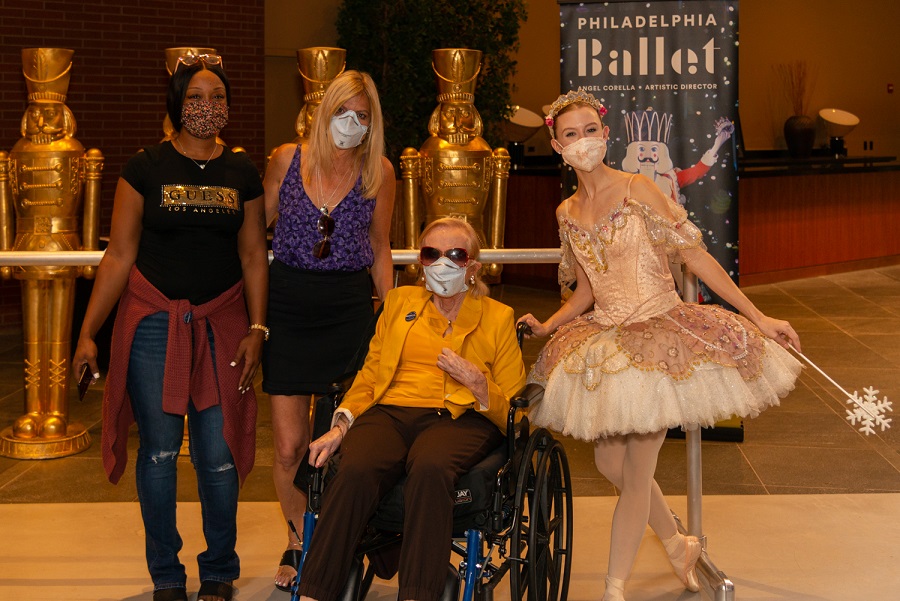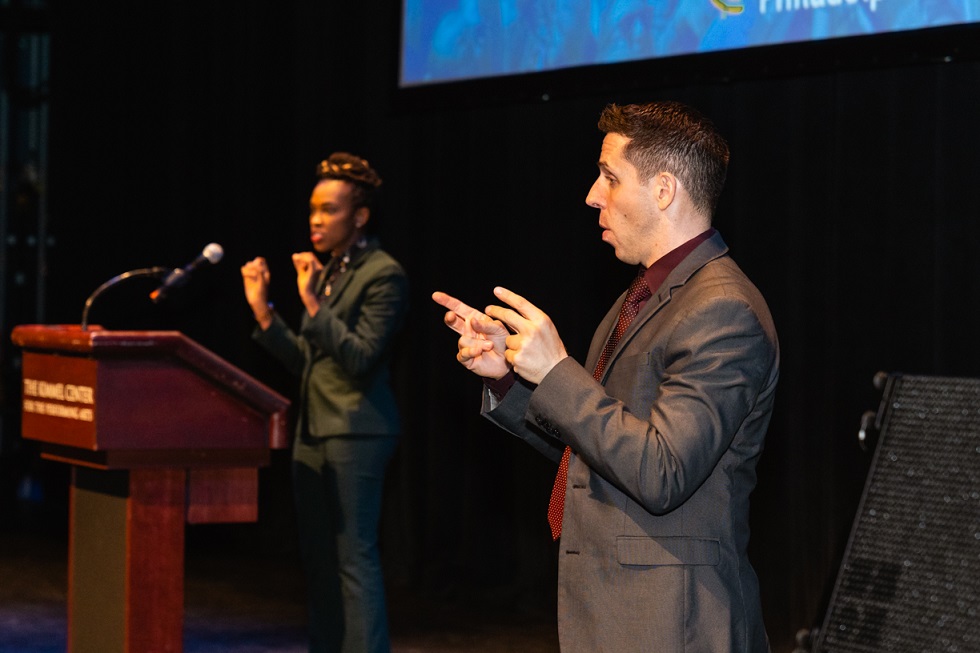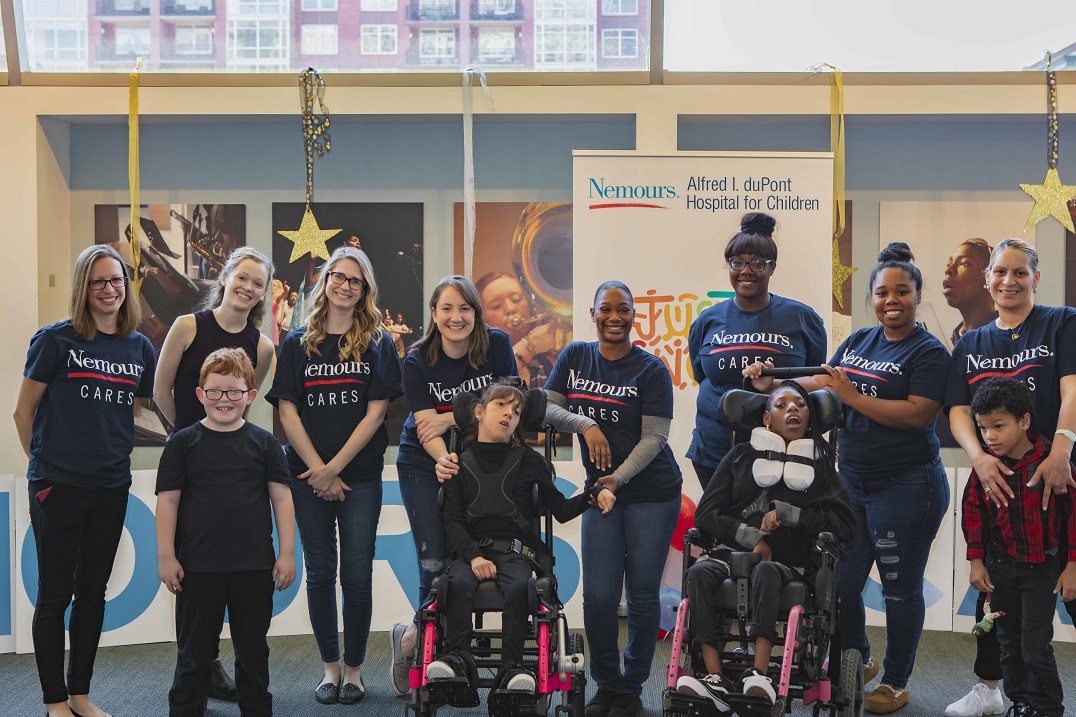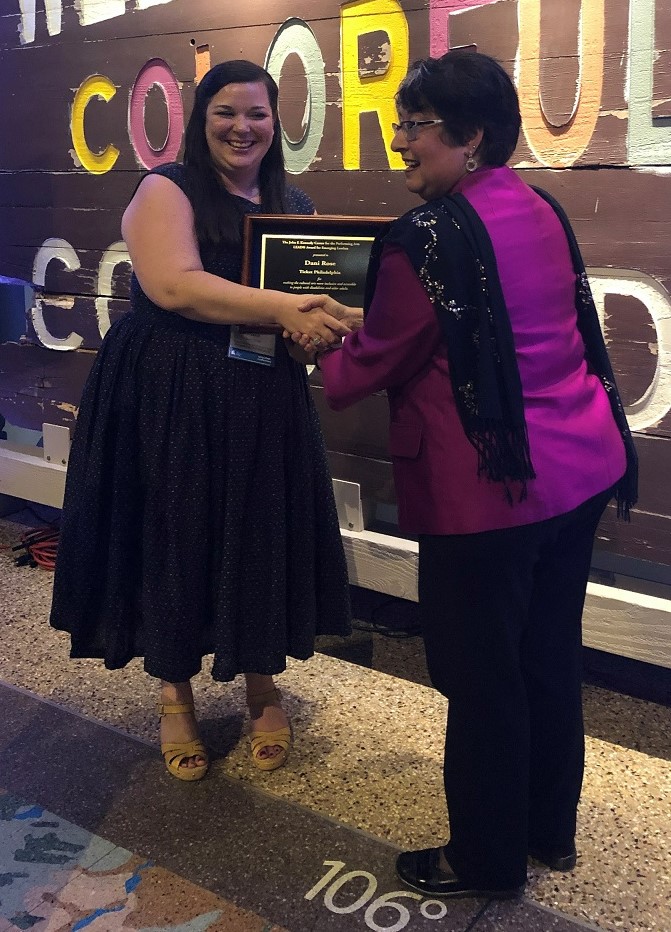My name is Dani Rose - I'm the training Manager and ADA Coordinator for Ensemble Arts Philly. I am also a certified ADA Coordinator for Title II & Title III entities. As a disability & cultural rights advocate, I’ve presented for both national and international conferences to champion greater Diversity, Equity, Inclusion, and Access in the cultural arts by matching radical inclusivity with outrageous customer service.
My passion for disability & cultural rights advocacy started about 6 years ago while working in the Ticket Philadelphia call center. Our management team needed someone to focus on accessibility, and asked if would I be interested. It was the first opportunity I'd had to take on a specialized project, so I thought “Why not?! I love learning new things!” I knew we had wheelchair accessible seats on our venues, and I knew a little about the rule for paths of travel, but beyond that it was going to be a new adventure in learning. About two months after, I was told I would be attending a conference to begin my training in the gloriously exotic travel destination of...Pittsburgh, PA.
Known as the John F. Kennedy Center's Leadership Exchange in Arts and Disability Conference, or LEAD, the annual conference is held across the country is a densely-packed schedule of learning, brainstorming, and leadership opportunities focused specifically on disability inclusion in the cultural arts. In Pittsburgh, I was fully introduced and immersed in Access Culture and Disability Rights. After meeting the people and hearing the message I knew that this was the work I was intended to do. I came back to Philadelphia with a 12-page to-do list and have committed every day since to ensuring that we were taking the steps necessary to live up to our commitment to inclusion.

Guests strike a pose with a dancer of the Philadelphia Ballet at an event in Commonwealth Plaza.
The focus of my work is understanding what we (as an organization) are required to provide to create equitable experiences, and what we can generally do to include the greatest number of individuals in our community. The law is actually written to include the our obligation as a functional social space open to the public to provide our programs, goods & services in a way that is accessible to all people and accommodating where it is not already accessible. A large part of studying Accessibility in the Cultural Arts & Disability Justice is a significant emphasis on the obligation of what arts institutions must provide.
For me that started with Ticketing, because that’s where I worked - and as I learned, the regulations in the Americans with Disabilities Act are very specific for ticketing! It makes sense as the ticket buying experience is the first point of contact a guest has as part of their experience. It's typically during the ticket buying process that a guest needs to disclose accommodations they may require for a performance, like Accessible seating, Interpreter View seating, Audio Description etc. It's also during the ticket buying process that a guest first understands the organization’s values in regard to accessibility and if folks with disabilities are welcome.
If a guest calls to inquire about which accessible seat includes the features they are most interested in, and the person answering the phone doesn't know the difference in these features, the guest is left without the information they need to attend. Should they proceed with the ticket purchase, they are risking that the seat assigned to them may not best fit their requirements.
When I attend a show, I like to know exactly where my seat is and get right to it. I take off my coat, I settle in, open my program… and I begin to fully engage with the experience. Imagine me getting to my seat and realizing there is a barrier in front of it, or that it's too tight to fit. Rather than settling in, I am now going through the embarrassing task of finding someone to help me and relocate me. If only I had known in advance which seat would have been more accommodating.
These obligations to provide go beyond ticketing though. When we provide a program, host an event, or present a show, we must also do so in a way that includes effective communication for all individuals, regardless of assistive technology they have available to them personally. For example, if folks like my neighbors attend a performance, they don't have to provide their own American Sign Language (ASL) interpreter – we would provide that for them.

An ASL interpreter provides interpretation during an event in the Perelman Theater.
When we educate ourselves, we can advocate for our community and the community of people with disabilities, whether we identify as having a disability or not. I believe the burden of education regarding disability rights laws should NOT be exclusively on people with disabilities. And without a doubt, as access service providers, we must be connected with, include, and consult folks with disabilities. We can all do better and be better when we are educated and informed about what the laws say we are obligated to do, what access services we can and should provide, and where we can be more socially responsible than what the law lays out for us
As a person who does not identify as having a disability, passionate advocacy means two things to me:
- Listening to the community of people with disabilities and using their guidance to inform our actions
- Taking the burden of education and action as my responsibility, so that burden does not remain with people with disabilities

Partnering with Nemours Children's Hospital to provide accessible and sensory friendly performances for all.
Part of learning more and engaging in conversation about our Accessible services is learning where we may have failed in the past to provide equitable experiences. Even with the best of intentions and goals and education, there are areas -- and I think honestly there will always be areas -- to improve. Speaking with our guests about access is the best way to know more and continue to grow.
As a result of feedback from our guests and my educational opportunities, I’m proud to think we’ve created a ticketing opportunity that is unlike any other. We call it the PCA Pass: an opportunity for certified, paid Personal Care Attendants (PCA) to accompany the person for whom they work into the performance at no additional costs. There are currently some laws and court decisions that inform this practice, but no actual legal requirement for ticketed events to provide caregivers free admission. At our locations, however, we understand that a PCA is performing an essential function for our guest who is attending a show. By offering the PCA Pass, we are honoring what our guests need to enjoy equitable experiences.
After several years of this successful PCA Pass program, I have been honored to present it at local, national, and international conferences to influence other cultural institutions to include this programming in their practices. In 2019, I was a recipient of the John F. Kennedy Center’s Leadership Exchange in Arts and Disability Conference Emerging Leader Award at the annual conference Denver Colorado, for dedication to Accessible Ticketing and the development of the PCA Pass.

Receiving my award at the Denver conference in 2019.
Some of the questions I am asked often during my Q&A sessions are "How do you know all of this?" or "Where can I being my own understanding?", and those are AWESOME questions.
Cultural arts have the power to expand our minds, engage our creativity and imagination, and share stories that may otherwise be untold. The magic of the performing arts is the tangible energy that flows from the performance to the audience, permeating the air like fantastical haze. Our hearts race, and our neck hairs and goosebumps respond, and we are moved to explode with applause and amazement at performance end. The lifelong benefit of engaging with the cultural arts should be open and available to anyone! And I am passionately committed to and advocating for and daily influencing greater inclusion and equity at Ensemble Arts Philly performances so that absolutely everyone can enjoy the magic.
Click here to learn more about Ensemble Arts Philly's Accessibility services. Learn more about our commitment to diversity, equity, and inclusion and how it encompasses the mission, co-workers, and programs here.